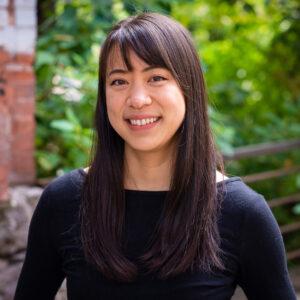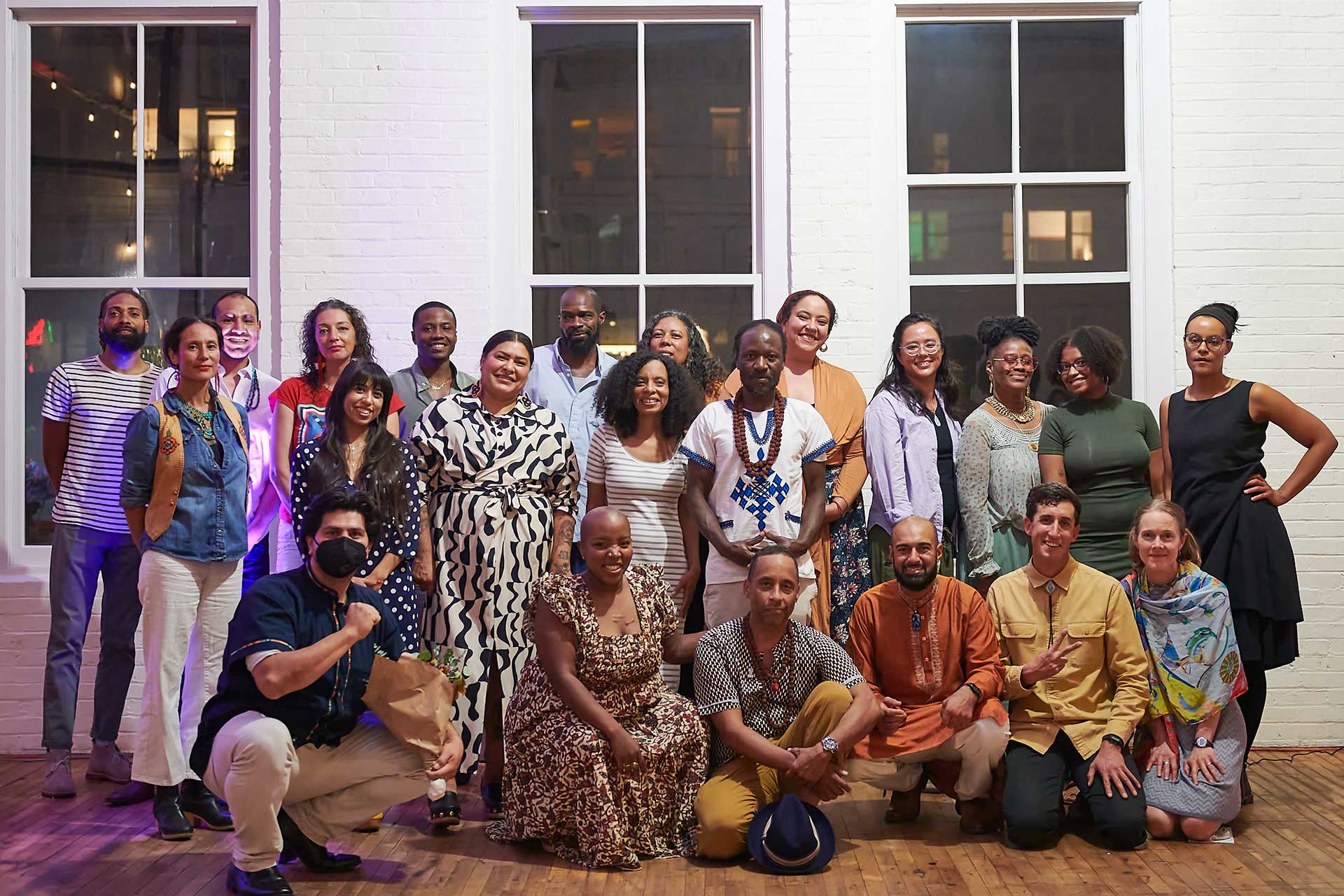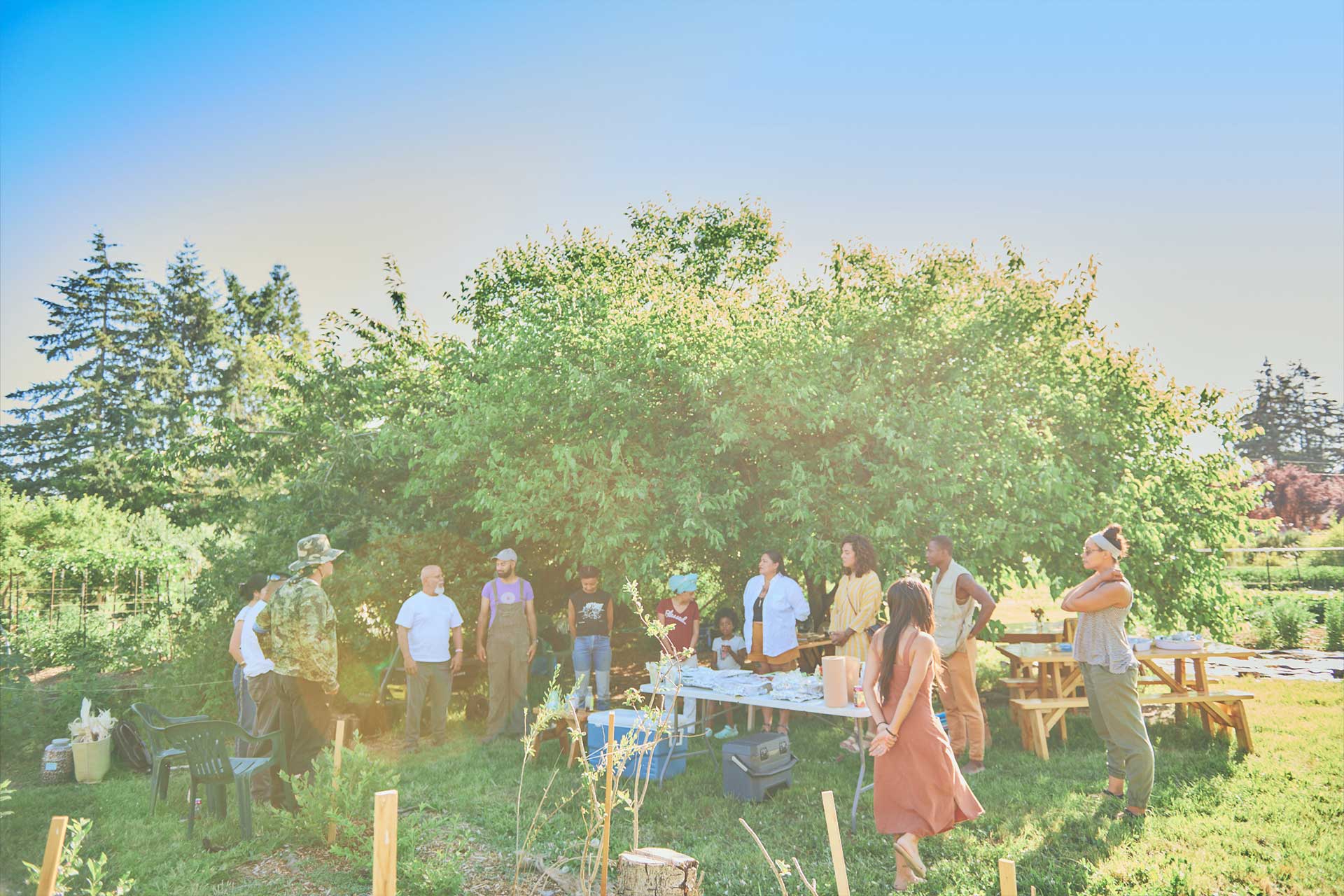
Communications Coordinator

Food Equity Coordinator
The fellowship created opportunities for both fellows and program staff to deeply connect. Photo credit: Jason Hill
As we celebrate the successes of the inaugural 2020-2021 Viviane Barnett Fellowship for Food Systems Leaders, we’re looking forward to the momentum of this movement and building programming for a 2023 cohort.
This past October, the 14 Viviane Barnett fellows, along with Ecotrust staff and program partners, gathered at the Native Arts and Culture Foundation to celebrate the achievements and heartfelt connections made during the inaugural 2021-2022 Viviane Barnett Fellowship for Food System Leaders.
It was a powerful and emotional evening for the graduating fellows, partners, and the Ecotrust project team. The event not only commemorated the end of the 18 months that the Fellows spent together, but it also celebrated the deep and incredible leadership of Black, Indigenous, and people of color (BIPOC) that exists across our regional food system.
The ceremony also celebrated the origin story of the fellowship, recognized the legacy of Black Portlander and community activist Viviane Barnett for whom the program is named, and honored each of the 14 fellows. Each fellow shared a story about their experience. Fellow Alisha Howard, who was also recently hired into a full time role at Ecotrust, said: “What I witnessed and experienced as an emerging food systems leader in the inaugural cohort was life changing. I will never be the same. What this opportunity gave me and so many others is something that doesn’t exist in any other agro- and people-centered space in Oregon.”

This past October, the Viviane Barnett Fellows, Ecotrust staff, and program partners gathered for a celebration at the Native Arts and Culture Fund. Photo credit: Jason Hill
Since the fellowship launched in June 2021, these aspiring, emerging, and experienced leaders have been developing, implementing, and advocating for food system projects that promote the conservation of our region’s resources. Fellows’ projects and interests spanned farming, food security, community organizing, climate justice, creative arts, resistance and liberation, and cultural and ancestral reclamation, among others.
For example, fellow Mick Rose, a former staff member and garden volunteer with Native American Youth and Family Center (NAYA), identified needs from the NAYA community for a space that supports food sovereignty and traditional ecological knowledge. Mick then worked with other NAYA staff to launch a community garden centering Indigenous traditional ecological cultural knowledge.
“
While the start of this fellowship was focused on food, we didn’t anticipate the healing outcomes this work would have—not only for the people participating in these programs, but that it would foster conversations and healing for those of us facilitating this work as well.
—SABRINA CERQUERA, FOOD EQUITY COORDINATOR
Another Fellow, Bea Yeh Ogden, is developing a tabletop role-playing game that uses premade character sheets, environment mini-boards, and more. Using fantasy and nature-inspired characters, the purpose of the game is to teach the life cycle of a sunflower, from seed to harvest and then back to seed and to demonstrate that the life cycle of a plant is tied to both the environment and other living creatures in that environment.
The fellowship also offered culturally specific training and leadership development opportunities, including workshops, peer-to-peer learning sessions, peer coaching circles, and field visits to support the implementation of their regenerative agriculture projects. The strength of community that the Fellows created with each other cannot be overstated.

The Viviane Barnett Fellows and program staff enjoy a meal hosted at Black Futures Farm. Photo credit: Jason Hill
Over the 18 months of this programming, the collaboration between the Ecotrust project team and partners from the Black Food Sovereignty Coalition, Mudbone Grown, Oregon State University’s Center for Small Farms, and the Multnomah County Health Department REACH program also deepened. Creating and facilitating the fellowship together gave the project team the time to build trust, align their efforts, and work strategically towards a common vision for the next generation of BIPOC food system leaders in our region.
“This fellowship not only supported the fellows’ projects, but it has also touched their lives deeply. Starting this fellowship off in the midst of pandemic allowed for a community to form and support each other. We had fellows who had career changes, moved cities, developed partnership, and deepen their relationship the land and food,” says Sabrina Cerquera, Food Equity Coordinator. “While the start of this fellowship was focused on food, we didn’t anticipate the healing outcomes this work would have—not only for the people participating in these programs, but that it would foster conversations and healing for those of us facilitating this work as well.”
In 2023, the collaborative behind the fellowship will launch the next cohort of Viviane Barnett Fellowship for Food System Leaders. The team plans to integrate the lessons and learnings from this inaugural cohort and to include more interpersonal programming and skills building. As the Viviane Barnett Fellowship for Food System Leaders grows, we’re excited to continue strengthening our partnerships and the impact of this work.
The Viviane Barnett Fellowship for Food System Leaders is offered in partnership with the Black Food Sovereignty Coalition, Mudbone Grown, Oregon State University Center for Small Farms, and Multnomah County Health Department REACH.
If you would like to learn more about the Viviane Barnett Fellowship, visit our webpage. If you have any questions, reach out to Sabrina at scerquera@ecotrust.org.

PROJECT PAGE
A cohort-based program designed for aspiring and experienced leaders of color working to build equitable, climate-resilient food systems